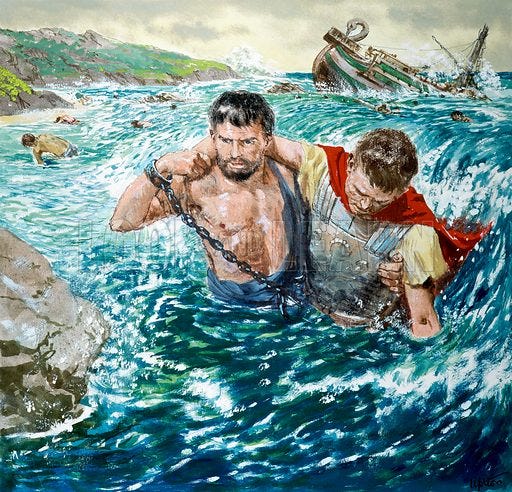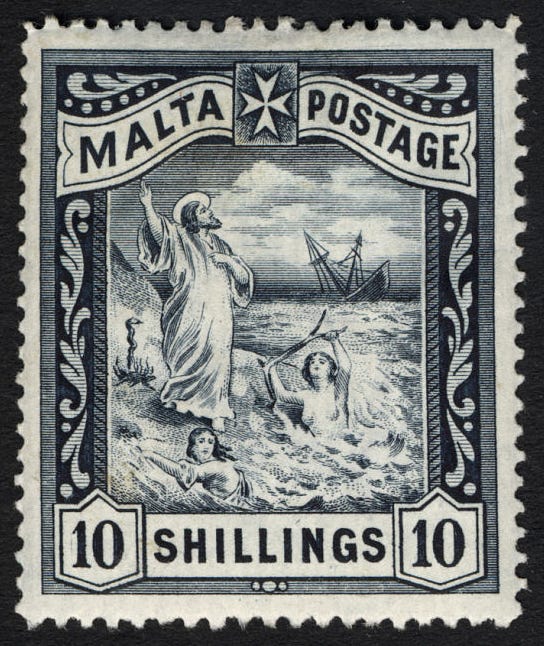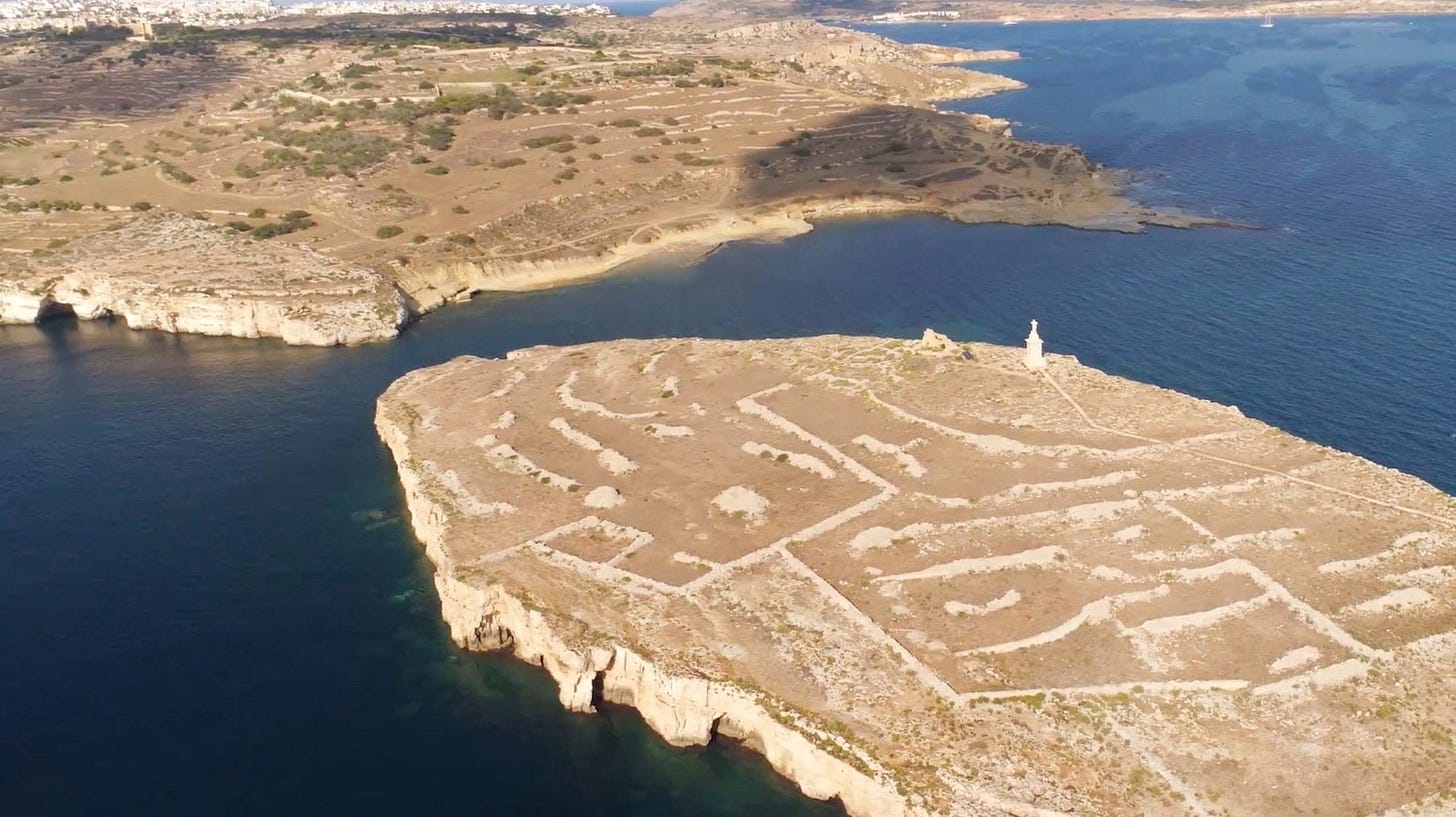February 10 - Genuine Faith: How St. Paul Survived the Malta Shipwreck
Trusting God's Plan Through Life's Storms
This is the day St. Paul was thought to have been shipwrecked in Malta in 60 AD.
In today's devotional, we will explore the extraordinary faith of St. Paul during his shipwreck at Malta. How can we maintain trust in God when faced with life's tempests? What can this ancient event teach us about navigating our own unpredictable seas of life?
"For we live by faith, not by sight." - 2 Corinthians 5:7 (NIV)
This Date in History
On February 10, in the year 60 AD, an event unfolded that would etch itself into the annals of Christian history: the shipwreck of St. Paul on the island of Malta. The journey that led to this moment was as tumultuous as the stormy seas that brought Paul to these unforeseen shores.
Paul, a prisoner under Roman guard, was en route to Rome, where he was to stand trial before Caesar. The ship, carrying not only Paul but also other prisoners and a crew, set sail from Caesarea. Despite the late sailing season, known for its treacherous weather, the centurion overseeing the journey decided to press ahead.
As Paul had forewarned, the ship soon encountered fierce, violent storms, and they lost all hope of being saved. For many days, the sun and stars were obscured by the tempest, plunging the ship into relentless darkness, both literal and metaphorical. Amidst this dire situation, Paul stood as a beacon of hope and faith. He encouraged the men, assuring them that there would be no loss of life, a message he attributed to divine assurance.
After fourteen days adrift, the sailors sensed they were near land. Their fears were confirmed when the ship struck a sandbar near Malta and began to break apart under the force of the waves. In this critical moment, Paul's leadership shone through. He urged everyone to eat, to maintain their strength, and then, as the ship disintegrated, he led them to make a desperate swim for shore.
Remarkably, just as Paul had promised, all 276 aboard the ship survived the ordeal. They found themselves on the shores of Malta, where they were met not with hostility but with unexpected kindness and hospitality from the island's inhabitants. This encounter marked the beginning of a significant chapter, both for Paul and for the island of Malta.
During his three-month stay on the island, Paul's impact was profound. He healed the sick, including the father of Publius, the island's chief official, and preached his faith, leaving an indelible mark on the island's history. The shipwreck, initially a misfortune, became a pivotal moment for the spread of Christianity on this strategically located island in the heart of the Mediterranean.
Paul's time in Malta, born from a shipwreck, highlights how unforeseen events can have far-reaching implications. This incident, a testament to survival, faith, and the unforeseen hand of destiny remains a significant and inspiring chapter in the narrative of early Christianity.
Historical Context
The Roman Empire under Emperor Nero was experiencing significant political and social transformation in 60 AD. Maritime travel across the Mediterranean, though advanced, remained dangerous during winter months. Despite these risks, the urgency of Paul's mission to Rome led to a perilous journey that would ultimately test both faith and survival skills.
Malta's strategic location between Sicily and North Africa made it a crucial hub for trade and military operations under Roman rule. The island's unique culture and traditions, though governed by Rome, provided an unexpected haven for Paul and his fellow survivors. This critical juncture would transform an apparent disaster into an opportunity for spreading Christianity across the Mediterranean world.
Did You Know?
The particular area where Paul's ship ran aground is traditionally identified as St. Paul's Bay on Malta's northern coast.
The island of Malta had been under Roman control since 218 BC, serving as a vital supply point for ships crossing the Mediterranean.
The local Maltese people spoke a Punic dialect derived from Phoenician, though Greek and Latin were also commonly used for trade.
Today’s Reflection
The shipwreck of St. Paul is not just a historical account of survival; it is a narrative rich in lessons about faith. Paul's journey to Malta was fraught with danger and uncertainty, yet his response was not fear but faith. This unwavering faith amidst adversity is a powerful illustration of the Apostle's deep trust in God's sovereignty. In the face of a life-threatening storm and shipwreck, Paul chose to rely not on human wisdom or understanding but on the assurance of God's protection and purpose. This decision to trust in God’s providence, even in the most perilous situations, challenges us to examine our response to the storms in our own lives.
The Apostle's experience in Malta teaches us that faith is not a passive acceptance but an active trust. When the storm was battering the ship, Paul did not merely wait for deliverance; he actively encouraged and guided those around him, embodying the essence of living by faith and not by sight. His faith was not blind optimism but a confident assurance in God's promise, an assurance that transformed fear into hope for everyone on board.
Paul's shipwreck also serves as a metaphor for the unexpected detours in our life's journey. Often, we find ourselves in situations we did not anticipate or desire, much like Paul on his unintended stop in Malta. In these moments, our faith is tested. Do we view these detours as mere obstacles, or do we see them as divine appointments? Paul’s experience invites us to trust in God's greater plan, even when it diverges from our expectations and desires.
Furthermore, the Apostle's time in Malta illustrates how God can use our trials for His greater purpose. The shipwreck, which initially seemed like a disaster, became an opportunity for Paul to demonstrate God's power and spread the Gospel on the island. This turn of events echoes the truth that God often uses our challenges to bring about His good work, both in us and through us. As believers, we are reminded that our trials can become channels of God’s grace and mercy to others.
The Scripture, "For we live by faith, not by sight," is particularly resonant when considering Paul’s ordeal. This verse calls us to a faith that transcends our current circumstances and sees beyond the immediate to the eternal. In our own lives, this means trusting in God's plan and timing, even when it conflicts with our understanding or desires. It is a call to believe in God's goodness and sovereignty, even when our situation seems bleak or incomprehensible.
In conclusion, St. Paul's shipwreck in Malta is not just an account of survival against the odds; it is a testimony to the power of faith in God's plan. It challenges us to trust in God, especially when the path ahead is uncertain or difficult. As we face the storms in our own lives, may we find the same courage to say, "We live by faith, not by sight," and in doing so, experience the peace and assurance that comes from trusting in God's perfect plan.
Practical Application
Consider keeping a "faith journal" for the next month. In it, record daily the moments where you felt challenged or uncertain, and reflect on how faith could guide your response. This practice encourages active engagement with trusting God's plan, mirroring St. Paul's steadfast faith during his unexpected journey to Malta.
Closing Prayer
Heavenly Father, Your faithfulness guides us through every storm. Like Paul, help us trust Your perfect plan even when our path seems uncertain. Give us courage to be a light to others in their darkness. Let our lives demonstrate unwavering faith that points others to Your saving grace. In Jesus' name, Amen.
Final Thoughts
As we reflect on St. Paul's shipwreck and his unwavering faith, we are reminded of the power of trusting in God's plan. This account not only serves as a historical testament but also as a spiritual guide, teaching us to navigate life's storms with faith and resilience.
Community Engagement
I love hearing from readers each day. Don’t worry, this isn’t a test—I promise! Feel free to drop a line or two in the comments below. You can answer one of the following questions, share your own reflections, pose a new question, or simply say hello. I can’t wait to hear from you!
What aspects of St. Paul's shipwreck story did you find most impactful?
How do you practice trusting in God's plan during your personal challenges?
In what ways can reflecting on biblical stories of faith influence your daily life?
How does St. Paul's experience in Malta encourage you in your faith journey?
In tomorrow's devotional, discover the extraordinary journey of a global icon who transformed a nation with humility and love. Delve into the powerful lessons of leadership that resonate deeply with Christian teachings.








That's why Paul didn't hardly flinch when he was bitten by one of the most poisonous snakes n the world he shook it off n kept building the 🔥. Bc GOD had already told him he WOULD go to Rome to world leaders n testify about the GOD of Abraham Isaac n Jacob
Tho He slay me, yet will I trust in Him. Job 13:15 There is no one else to turn to!